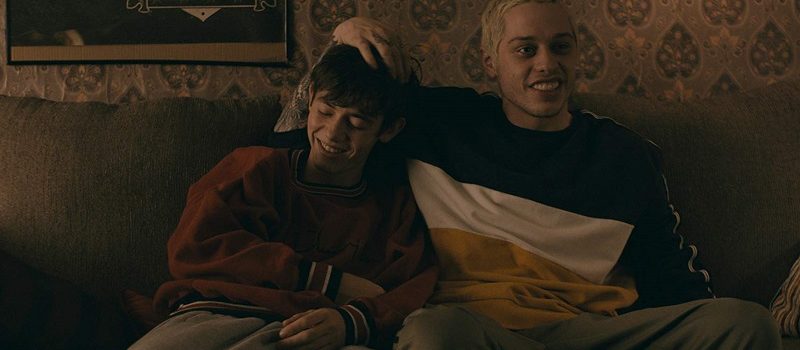Jason Orley, writer-director of Big Time Adolescence, makes his directorial debut with the coming-of-age flick that stars SNL breakout Pete Davidson and a young actor who you will be hearing more from, exponentially as the years pass, Griffin Gluck. The SNL star portrays Zeke, that guy we all knew from high school who stuck around town and didn’t really try too hard to “grow up.” In Orley’s film, Zeke has a young pup, Mo (Griffin Gluck), who has been looking up to him for years. See, Zeke dated Mo’s older sister and the pair stayed friends long after that romantic relationship soured.
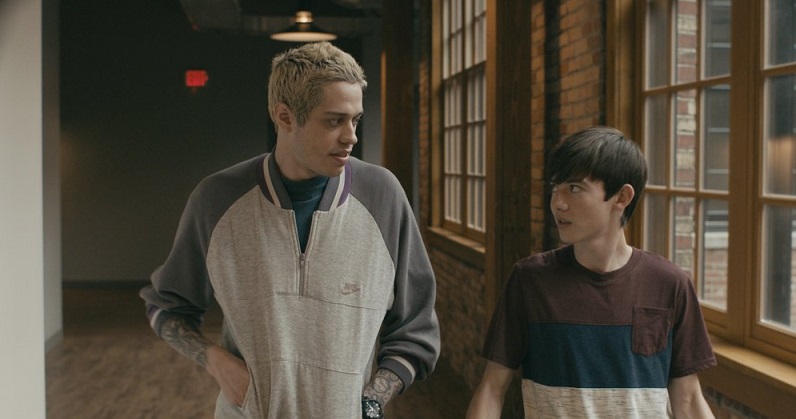
Orley phoned The Movie Mensch for an exclusive interview where we delved deeper into the origins of Big Time Adolescence and how through making this film, he has discovered that having a “party” or “grown-up” mentor closer to our age than our teachers or parents was not an elusive concept. Many folks told Orley that they too had that one friend who showed them the ropes and just as quickly as they came into their lives, they were gone. The writer-director also clues us in to what it is about Davidson that makes him so special as a performer and collaborator who “elevated” the material well beyond Orley’s wildest dreams.
We also get the filmmaker’s take on what it is about these high school or teenaged-based flicks that are so beloved, regardless of when they were made or who it is that starred in them. There is a long history of beloved Hollywood classics and the audience shows no signs of growing weary of flicks that chronicle life as a teenager. Big Time Adolescence firmly deserves to be placed among those flicks as it debuts this weekend.
Also, he scored big time by getting sitcom star and teen movie legend Jon Cryer to play Mo’s dad. What did it mean to Orley to score the actor who made so many teen movies so memorable (Pretty in Pink and others) in a teen-centric flick and have him playing the paternal role?!
The Movie Mensch: First off, congratulations on your film. It really struck a chord with me. It got me thinking, what was the genesis of Big Time Adolescence?
Jason Orley: I was always really into this idea of male friendship in the teenage years. And I think that in talking to my friends and my experiences, there was always universally someone being corrupted and someone doing the corrupting. I think everyone has had that kind of friend. That’s kind of how you grow up. I was really interested in exploring that. It’s kind of like a love story, because almost always that relationship ends the same way. That first guy you always think is cool growing up is almost never someone that you stay friends with or that feeling kind of remains. I thought it’d be fun to treat it like a love story between two boys who will become friends and that arc of idolizing someone, becoming their best friend and then outgrowing them. It’s something that… While the script took a long time, it took to get made. And it was one of the earliest scripts I wrote and I kind of changed things all the time and that arc always stayed the same, of idolize… Those three beats, that was always in my head.
The Movie Mensch: Well, you nailed it. I mean, I had a “Zeke” and it made me think of him from back in the day. So, you certainly hit all the right emotive notes there.
Jason Orley: I appreciate you saying that. That was the goal. That was my goal.
The Movie Mensch: I hadn’t really thought about him much for a long time. Now, I’ve been thinking about Dave now for like 24 hours.
Jason Orley: It’s like everyone has that person who was so instrumental in their lives, who they never think about anymore. So that’s kind of what this was for me. It was me remembering those friends in my life.
The Movie Mensch: You clearly have a connection with Pete. First of all, speaking generally, what do you think makes him so special?
Jason Orley: It’s funny. When I cast him in this, all I had seen him do was standup. I had seen him do a roast on Comedy Central. I had seen him on SNL a little bit. I knew he was really funny, but I didn’t know [much] beyond that. He just felt like Zeke to me when I saw him. So, it was a little bit of a leap of faith where I was like, “At the very least, this movie will be very funny.” The fact that he was so talented, and the emotional stuff came through and so relaxed as an actor, which is such dumb luck for me. Every day, he elevated the movie in a way that I could never have really imagined.
The Movie Mensch: How so?
Jason Orley: My Zekes didn’t necessarily look like Pete’s Zekes. They weren’t covered in tattoos. Ferris Bueller [was] what I had imagined. Then when Pete came on board, he wanted to do the character the way that those guys were like for him because that felt more personal. He could access that. We talked a lot about that, and he brought this guy to life in a way that was amazing.
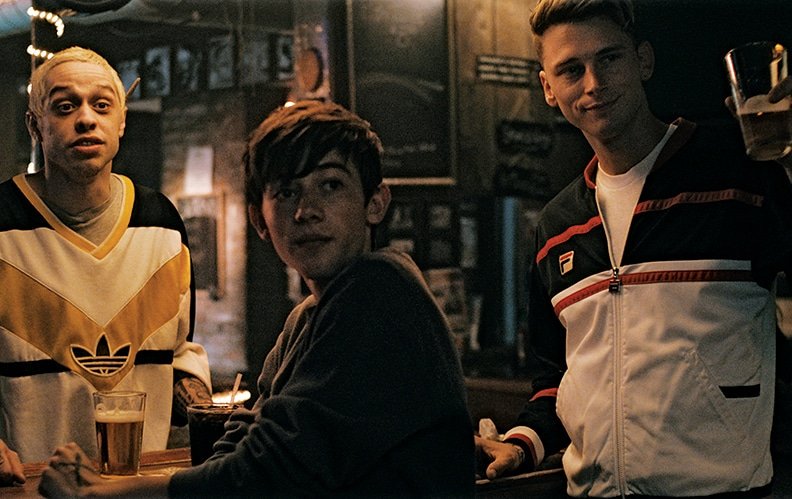
The Movie Mensch: Did you have to alter your script in any way to accommodate what Pete was bringing to the role and exploring?
Jason Orley: No, actually! The story didn’t even change. It’s like you said, it’s a kind of a universal story. The beats of the story don’t have to change. But how he dresses, where he lives, what his apartment looks like … Pete was sending me pictures every day in prep. “I want to wear this watch. I want to wear these shoes.” We’d go back and forth nonstop and really built this character. Which was amazing. I think what also drew me to Pete, and to answer your question of why people like him, it’s just that he’s just very, very real. There’s no act with him. He’s a very honest actor. The great thing is in the editing room we had a lot to play with.
The Movie Mensch: I can’t imagine Big Time Adolescence without him. Then, there’s Griffin. Your entire movie really works or doesn’t work based on the casting of Mo. What was it about Griffin that you knew you had your Mo?
Jason Orley: When I had written the script, I had imagined someone much shorter. It was a really tiny kid. Then Griffin came in and I was like, “He’s too handsome and cool.” Then, he started. He can hold his own with Pete and all those older guys. He accesses this real youthful innocence that you just want to protect him. It was really important to me that we cast a real teenager. Not like the TV casting of this where it’s an 18, 19 year old playing a teenager. The main reason was because I wanted it to feel dangerous the second you saw them on screen together. I wanted you to separate them. I wanted a parent to be like, get this kid out of Pete Davidson’s apartment. You know?
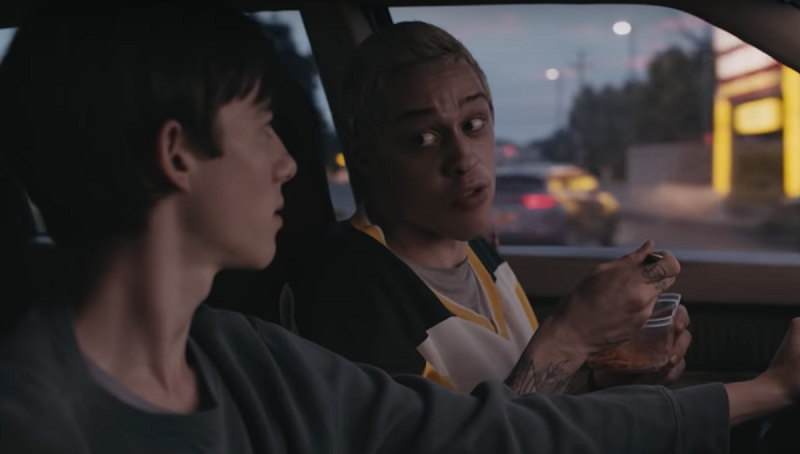
The Movie Mensch: Absolutely, and that is exactly what occurred.
Jason Orley: The second you see these two guys in a car together—it was our first day of shooting and Griffin was wearing this polo shirt and Pete was dressed like Zeke. This feels that he’s a risk. I just rolled the cameras. You want to save this kid immediately! He just exuded that. And he’s funny. He’s really funny. His comedic instincts were spot on.
The Movie Mensch: All of the young actors you cast were brilliant.
Jason Orley: Yes! Thanks. Griffin and there’s Thomas Barbusca, who played his high school friend. Also, Oona Laurence, who played Sophie. I kept thinking when we were shooting at the very least it would, no matter what happens with this movie, I know it’s going to be one of those movies where people are like, “Wow, every one of those kids went on to have amazing careers.” When you see an old high school movie like Empire Records and you’re like, “I know all these people.” I really felt like I was making one of those movies. Every one of these kids is just so talented.
The Movie Mensch: Yeah, it’s funny you mentioned that. I was going to ask you. This film, I think, belongs with some of those coming of age films that every generation embraces it. Whether it’s Better Off Dead or Perks of Being a Wallflower. What do you think it is about the landscape of these movies that are so beloved and continued to be so beloved?
Jason Orley: I think there’s a timeless idea—the idea of growing up. This kind of adolescence and coming of age is just a timeless idea. Everyone does it. Everyone has always done it. And the way you do it hasn’t changed a lot. I don’t think the story of Mo and Zeke is specific to 2020. It’s how you grow up, by seeing somebody else and having those experiences and making friends and outgrowing friends. I think for me, personally, in making this movie it was important to make it feel timeless as much as possible. All of my favorite coming of age movies didn’t feel rooted in their time. I tried to use cell phones as little as possible. No text bubbles popping up on screen or graphics like that. I didn’t want the plot to revolve around those things.
The Movie Mensch: You and the film were at Sundance. What was that experience like? I mean, that’s the epitome of indie cinema. It’s the place to be. And you were there.
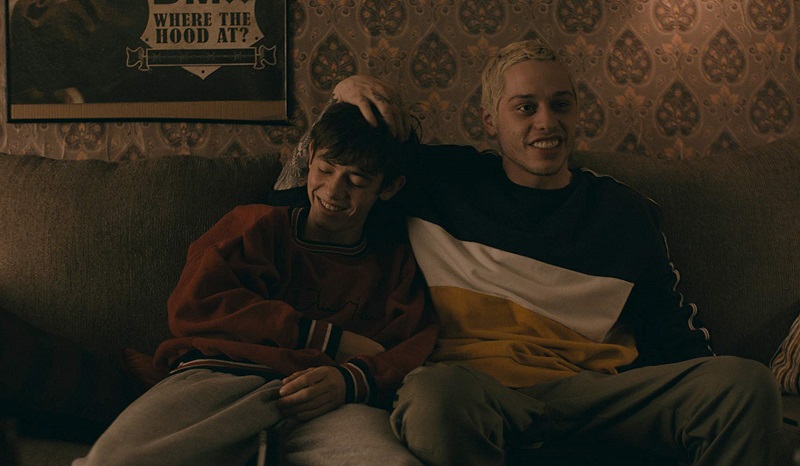
Jason Orley: What’s funny is that I found out that my wife was pregnant a week before I went to shoot this movie and she gave birth 10 days before Sundance.
The Movie Mensch: Wow!
Jason Orley: So, it took me exactly nine months to make this movie. Then, when I got to Sundance, which was a complete whirlwind of shooting, editing and everything. Then, it was this looming thing of, “Oh my god, my baby’s due date is the same day as Sundance!” Literally the same day. Yeah, I would’ve missed Sundance. Luckily the baby came a couple weeks early. I was so stressed out about the whole thing. When I was at Sundance, it was so incredible. I was so anxious because no one had seen the movie. We moved so quickly to get the movie ready for Sundance. I think when we got into Sundance that was a moment of validation. Sundance was the first time that my cast saw it, that a lot of the crew saw it, and it was incredibly exciting and nerve wracking and I wanted to vomit the whole time [laughs]. I’d love to go back to Sundance without a movie and just experience because it looks like it’s a lot of fun.
The Movie Mensch: Lastly, I wanted to ask about Jon Cryer. It’s great to see him on the big screen again. How did it come about that you got Jon for your movie? I couldn’t help but think that we’re talking about these timeless coming of age films and here you Jon Cryer, who was in so many of those flicks. You got him to play a dad to a teen, Mo, when he made his name in films that featured him as a teen.
Jason Orley: That was important to me, obviously. Yeah. There’s so much of this movie that are a nod to the movies that he made growing up, right? You’ve got teens in a museum and a swimming pool and you’ve got scenes in a good car. So, having someone from that world is so important.

